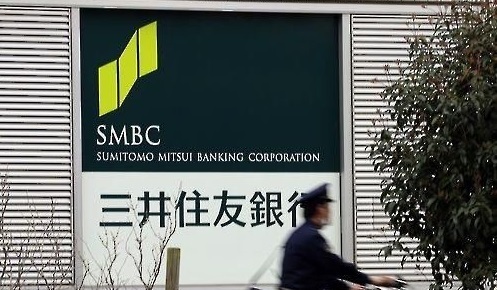Japan’s export curbs bring attention to Tokyo’s capital in local market
FSC chief dispels concerns, saying Japan’s possible withdrawal won’t affect market
By Jung Min-kyungPublished : July 7, 2019 - 17:34
Japan’s decision to restrict key supplies for South Korea’s semiconductor industry has shed light on the considerable size of Japanese investment in the nation’s financial market, stoking concerns over its impact on the nation’s economy if political bickering spreads to the capital market.
According to data from the Korea Center for International Finance on Sunday, Japanese banks held nearly 21 trillion won ($17.6 billion) worth of outstanding loans in Korea. The institutions include Japan’s top banks such as Mitsubishi UFJ Financial Group, Sumitomo Mitsui Banking Corp., Mizuho, and Yamaguchi.
According to data from the Korea Center for International Finance on Sunday, Japanese banks held nearly 21 trillion won ($17.6 billion) worth of outstanding loans in Korea. The institutions include Japan’s top banks such as Mitsubishi UFJ Financial Group, Sumitomo Mitsui Banking Corp., Mizuho, and Yamaguchi.

This accounts for 27.1 percent of the 77.9 trillion won of outstanding loans held by overseas banks here. It is the second-largest in volume after Chinese banks, which account for 34.3 percent.
Japanese funds also held about 12.5 trillion won worth of Korean stocks as of May, according to separate data from the Financial Supervisory Service, the nation’s financial watchdog. This amounts to 2.3 percent of total overseas investment and ranks ninth, trailing behind other top economies, such as the US and the UK.
Before trade tensions heightened last week, the KCIF said in February that there was a high possibility that Japanese banks might be considering minimizing cross-border exposure of loans and investments, fueling industry watchers’ concerns that coupled with the latest trade tension, it could abruptly drain Japanese investment from the Korean market.
Japanese banks’ had stepped up investment and lending overseas after the 2008 financial crisis, pushed by years of low or negative interest rates.
Outside the cross-border finance sector, Japan’s retaliatory moves have also brought attention to South Korea’s trade deficit with Japan -- which hasn’t been in the black since the two normalized relations in 1965.
Data from the Ministry of Trade, Industry, and Energy showed Sunday that the nation’s trade deficit with Japan regarding materials and equipment for the first half of the year came in at 7.8 trillion won.
Last year, the corresponding figure for the entire 2018 fiscal year was 17.7 trillion won.
South Korea’s overall trade deficit with Japan was $24 billion in 2018, according to the Korea International Trade Association.
Data showed Korea’s heavy reliance on products supplied by Japan, which has often been overlooked by the nation’s export-reliant economy.
“A key reason South Korea is struggling to swing into surplus with its trade with Japan is due to its large reliance of materials and parts,” Park Cheol-hee, an international relations professor at Seoul National University, said at an event hosted by the Federation of Korean Industries in April.
Addressing concerns surrounding the capital market, Financial Services Commission Chairman Choi Jong-ku dispelled such worries Friday, saying that Japan’s possible move to expand the scope of its restrictions to the finance sector will “not affect the local market.”
“Japan could withdraw loans and investment in the local capital market or place restrictions on money transfers, but none of it carries actual weight,” Choi told reporters.
The financial regulator added that South Korea’s economy has stabilized to the level where more options are available in terms of borrowing, unlike the period of the 2008 financial crisis.
Furthermore, with the South Korean government vowing efforts to reduce reliance on Japan-supplied products, experts noted this is an opportunity for bold moves.
“Before this, Korean companies faced difficulties in manufacturing materials and parts due to trade relations with Japan,” said Kim Yang-peng a researcher from the Korea Institute for Industrial Economics & Trade.
“Now with the trade dispute, it’s an opportunity to take further steps,” he added.
By Jung Min-kyung (mkjung@heraldcorp.com)








![[Graphic News] More Koreans say they plan long-distance trips this year](http://res.heraldm.com/phpwas/restmb_idxmake.php?idx=644&simg=/content/image/2024/04/17/20240417050828_0.gif&u=)
![[KH Explains] Hyundai's full hybrid edge to pay off amid slow transition to pure EVs](http://res.heraldm.com/phpwas/restmb_idxmake.php?idx=644&simg=/content/image/2024/04/18/20240418050645_0.jpg&u=20240419100350)






![[From the Scene] Monks, Buddhists hail return of remains of Buddhas](http://res.heraldm.com/phpwas/restmb_idxmake.php?idx=652&simg=/content/image/2024/04/19/20240419050617_0.jpg&u=20240419175937)

![[KH Explains] Hyundai's full hybrid edge to pay off amid slow transition to pure EVs](http://res.heraldm.com/phpwas/restmb_idxmake.php?idx=652&simg=/content/image/2024/04/18/20240418050645_0.jpg&u=20240419100350)

![[Today’s K-pop] Illit drops debut single remix](http://res.heraldm.com/phpwas/restmb_idxmake.php?idx=642&simg=/content/image/2024/04/19/20240419050612_0.jpg&u=)